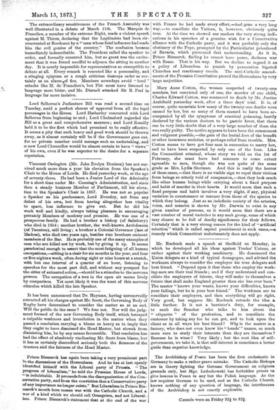Mary Anne Cotton, the woman suspected of twenty-one murders, but
convicted only of one, the murder of one child, Charles Edward Cotton, was sentenced to death by Mr. Justice Archibald yesterday week, after a three days' trial. It is, of course, quite uncertain how many of the twenty-one deaths were caused by her, but so many of them seemed to have been ac- companied by all the symptoms of arsenical poisoning, hastily declared by the various doctors to be gastric fever, that there can be very little doubt that of a very large number of them she was really guilty. The motive appears to have been the commonest and vulgarest possible,—the gain of the buriaLfees of the benefit or other insurance societies, or perhaps relief from trouble. Mrs. Cotton seems to have got four men in succession to marry her, and to have been suspected by only one of the four. Like the Connecticut criminal, whose story we told on the 1st of February, she must have had manners to some extent agreeable to men, though she was not quite of the same grade as Mrs. Lydia Sherman. And this is really the horror of these cases,—that there is no visible sign to repel their victims from beings so utterly void of compassion,—that they look much like other human beings while carrying about a fixed purpose and habit of murder in their hearts. It would seem that such a fixed purpose and habit involves a very slight, if any, physical variation in countenance or manner from those of the species to which they belong. Just as an indefinite variety of the arteries, veins, and muscles is shown by Mr. Darwin to exist .in any given number of persons, so it would seem that there are a vast number of moral varieties in any such group, some of which may chance to be full of deadly significance for their fellows. Certainly that is a very strong reason for the kind of "artificial selection" which is called capital punishment in such cases,—a remedy which Connecticut unfortunately does not apply.






































 Previous page
Previous page